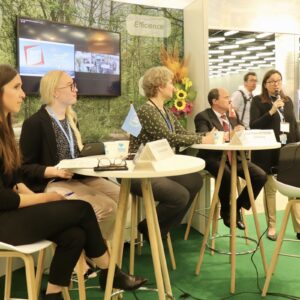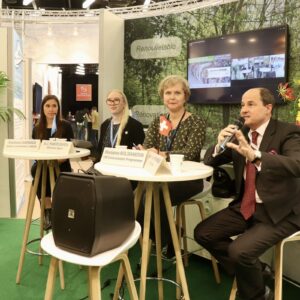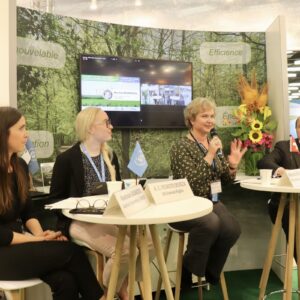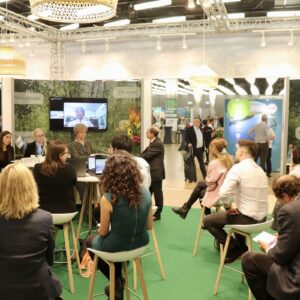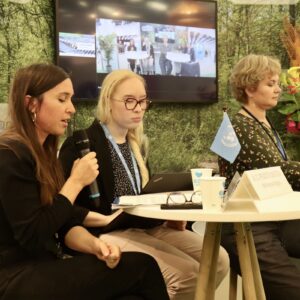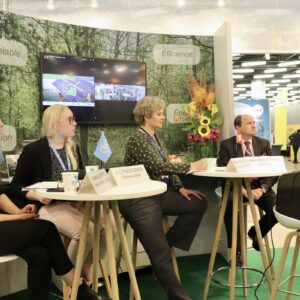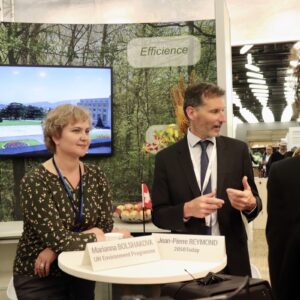Événement Conférence
Clean Energy with Clean Conscience: The Importance of Human Rights, Health and Well-Being When Transitioning to Clean Energy for Sustainable Development
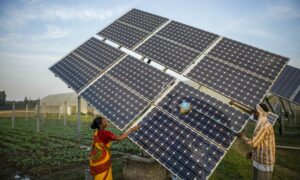
01 Jun 2022
14:00–15:00
Lieu: Palexpo & Online | Webex
Organisation: Haut commissariat des Nations Unies aux droits de l'homme, Organisation mondiale de la santé, International Service for Human Rights, 2050Today, Franciscans International, Geneva Environment Network
As energy transition issues raise questions of human rights not being upheld at the local level, this session co-organized by OHCHR, WHO, ISHR, 2050Today, Franciscans International, and the Geneva Environment Network aims to strengthen the relationship between clean energy, health and the respect of human rights towards Sustainable Development. This event was part of the 23rd edition of the European Energy Transition Conference, taking place from 31 May to 2 June 2022.

About this Session
Energy transition issues also raise questions of human rights not being upheld at the local level. Geneva, home of various international bodies and organizations is where some of these conversations are held. In consultations with local communities and defenders on the ground, we need to identify the problems and challenges that any energy transition poses for people’s rights, such as access to healthcare, sanitation, clean water, land rights, as well as access to information, to public participation and the respect of full prior informed consent (FPIC), in particular on the lands of Indigenous Peoples.
This session discussed the importance of ensuring Human Rights while transitioning towards clean energy. Human Rights Council resolutions on the “Human right to a clean, healthy and sustainable environment” (48/13) and “Recognizing the contribution of environmental human rights defenders to the enjoyment of human rights, environmental protection and sustainable development” (40/11) and other policy developments instruments can help inform discussions on what to consider when starting a clean energy project.
The event had the participation of experts as well as of environmental human rights defenders who spoke about their lived experiences to enhance a better understanding of the situation on the ground.
Speakers
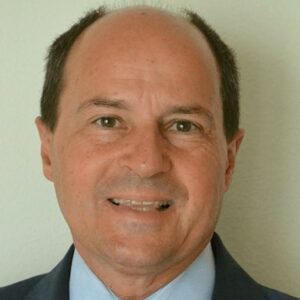
Jean-Pierre REYMOND
Executive Director, 2050Today
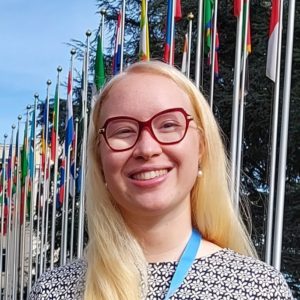
Ana Carolina PEIXOTO DEVEZA
Sustainable Environmental Management Specialist, OHCHR

Heather ADAIR-ROHANI
Technical Lead on Energy and Health, WHO
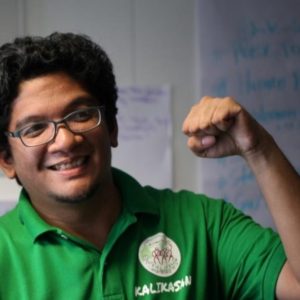
Leon DULCE
FIlipino Environmental Defender of the Kalikasan People’s Network for the Environment
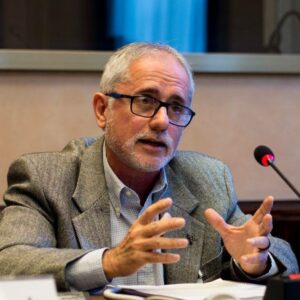
Rodrigo PERET
Brazilian Franciscan Brother, Pastoral Land Commission of Uberlândia | Franciscans International

Anastasia GIADROSSI
Associate Expert in Legal Affairs, Aarhus Convention Secretariat, UNECE

Marianna BOLSHAKOVA
Regional Coordinator, Environmental Law and Governance, UNEP Europe Office | Moderator
Video
In addition to the live WebEx and social media transmissions, the video of the event is available on this webpage.
Summary
Welcome
Jean-Pierre REYMOND | Executive Director, 2050Today
We are here at Geneva House, a coalition of different entities, the Geneva Canton, the City of Geneva, Energy Provider and 2050Today. 2050Today represents 60 international organizations and Permanent Missions that are united to reach a zero-emissions goal. This is an ambitious challenge we are trying to meet as soon as possible.
The discussion we will have this afternoon is extremely important in my view, because discussions on energy transition, moving to clean energies and so on are frequent, but we often forget the people in this challenge. When people are involved, the first thing to do is to respect human rights. Therefore, in transitioning to clean energy, we should take the opportunity to drastically improve respect for human rights. We must be at peace with nature, but first, we must be at peace among ourselves. If we are to adjust to a real and long-lasting transition, which looks rather like a revolution, we must accelerate the pace of action. It is a tremendous challenge and not a single minute should be lost.
Introduction and Moderation
Marianna BOLSHAKOVA | Regional Coordinator, Environmental Law and Governance, UNEP Europe Office | Moderator
Energy Transformation is essential to meet the Sustainable Development Goals and the climate goals. Failing to transform how we produce and use energy is not an option anymore. It would affect millions of livelihoods, billions of people and communities across the world, while the transition to clean energy can have a significant impact on them. Adopting a rights-based approach in this transition is key to securing equitable and sustainable universal access to energy and to reverting inequalities, including impacts on the most vulnerable communities and groups. Today’s panel is diverse in terms of geographical and sectorial perspectives, adding value to this conversation which should always be made up of plural voices.
Panel Discussion
Ana Carolina PEIXOTO DEVEZA | Sustainable Environmental Management Specialist, OHCHR
The messages I will be sharing today are part of two documents OHCHR (Office of the High Commissioner for Human Rights) has been working on recently: Renewable Energy and the Right to Development: Realizing Human Rights For Sustainable Development and Environmentally Sound Technology and the Right to Development: Realizing Human Rights for Sustainable Development.
In the triple planetary crisis of climate change, biodiversity loss and pollution we are facing, the energy sector plays a key role. First, two-thirds of global emissions derive from energy production and use. Secondly, the lifecycle of many technologies used in mining and combustion releases toxic ashes that contaminate water and jeopardize the health and well-being of people. These violate the right to life, to water and sanitation and the recently recognized Right to a Healthy, Clean and Sustainable Environment. On the one hand, decisions taken locally have global consequences. On the other hand, the consequences for vulnerable populations are disproportionate. Consequently, the right to development of not only current but future generations are at risk, because they are the ones living longer with these consequences. As Principle Three of the 1992 Rio Declaration mentions, the right to development must be fulfilled to meet the developmental and environmental needs of present and future generations. The Clean Energy Transition is an opportunity for a just transition. For this, an enabling environment to ensure equitable access to renewable energy is necessary. Therefore, governments must create a conducive investment environment for renewables and businesses whose business models are centered on mitigation, while also strengthening research and development. These can in turn promote the rights to livelihood and to decent work, as projections show that the renewable jobs will offset the job losses in the fossil fuels sector. On another front, it is important to address gender equality. Women entrepreneurs face huge challenges in the renewable energy industry, especially in finding loans and developing their businesses. They can be active change agents for instance in offsetting off-grid projects. Therefore, new skills and capacity building for women, for youth must be kicked off through the support of data science, digital technologies, and societal efforts to stop the discrimination that exists in the energy and IT industries. One example of what OHCHR is doing in relation to the work of 2050Today and of how to build resilience through crises takes place in our offices in Lebanon. They are facing a severe food crisis, extended power outage (with electricity as scarce as 45 minutes a day), private generators only working at night and other challenges. To alleviate these, we bought mobile solar chargers for them. This increases their productivity and work during the day and manages with the batteries.
Heather ADAIR-ROHANI | Technical Lead on Energy and Health, WHO
Participants may be wondering why the WHO (World Health Organization) is part of this discussion on energy. Energy is extremely important for protecting people’s health, preventing disease, as well as to ensuring access to delivery of healthcare services, particularly in low- and middle-income countries. Energy is part of the WHO work as it aims to lessen the carbon footprint of the health sector emissions really achieving our 2050 goals.
According to WHO estimates, air pollution itself causes 7 million premature deaths each year around the world. Much of this air pollution is due to the inefficient combustion of fuels, which leads to a lot of health-damaging pollutants released into the air. This leads to deaths and diseases like heart diseases, strokes, chronic obstructive pulmonary diseases, pneumonia, and lung cancer. Additional epidemiological evidence shows that there even are additional diseases associated with air pollution exposure: adverse pregnancy outcomes, low birth rates and other issues passed to babies exposed to air pollution in the womb. In addition to these, air pollution is increasingly associated with cognitive issues, diabetes, and many other adverse health effects.
Most air pollution is caused by a lack of access to clean and efficient and renewable energy indoors and inefficient combustion of fuel and energy, in industries, in rural and urban settings. SDG7, contains three goals associated with access to energy, universal access to modern energy services, doubling the reliance on renewable energy, and increasing the efficiency, all have benefits for health. This is important not only for people with easy access to energy but also for those people living with absolutely no energy. Curbing air pollution has countless benefits, including positively contributing to halting climate change itself, being one of its main causes.
Pushing forward the concept of energy as a human right is critical, especially to alleviate the situations of low- and middle-income countries for what concerns their households and healthcare facilities. WHO, as the custodial agency for the clean cooking SDG7, estimates around 2.4 billion people still lack access to clean cooking for their main cooking, excluding people who use inefficient cooking just part of the time so, this number is probably bigger. This $2.4 billion people leads to about 3.2 million premature deaths each year. These are the very people who live in dire conditions and are vulnerable to many diseases, they often have to spend many hours collecting fuel and water instead of going to schools or producing an income. So, by reviving access to clean energy in homes and protecting their health, we are advancing these people’s lives and allowing them to have a more fruitful, fair and equitable opportunity to live the fullest. In addition, WHO is trying to accelerate access to clean cooking and to electricity. In many cases, that requires reliance on more renewable fuels, particularly for rural areas where decentralized renewable energy systems are critical to ensure people can access clean cooking, clean heating, and clean lighting in the home.
The transition to clean energy in many middle and low middle-income countries represents an opportunity to switch from polluting fields and technologies such as cooking over an open fire, using unprocessed coal and simple stoves, charcoal, and simple stoves to thermal efficient cookers, which can be paired with solar home systems or induction cookers. Thus, WHO approach consists of improving energy efficiency while also tackling energy access problems with renewable energy, which protects the health of the people. Clean energy not only protects the health and reduces air pollution, but it can also help deliver care. WHO is about to relaunch a new report in July that will provide the first global status on the electrification of healthcare facilities. One of the most recent studies has shown about 25% of healthcare facilities in Sub-Saharan Africa have absolutely no access to electricity. Women have to give birth in the dark, with no operational cool equipment and there is no opportunity for fetal heart monitoring or incubators. WHO is therefore trying to capitalize on the decentralized renewable energy and other clean energy solutions to ensure that healthcare facilities, hospitals, clinics and pharmacies have the necessary energy to deliver healthcare services. No access to clean energy in homes leads to diseases, which leads to the hospitalization in facilities where electricity is lacking. This vicious cycle needs to be stopped by providing access to electricity for all. This is high on the WHO priorities list. The Health and Energy Platform of Action ( HEPA) convened with the World Bank, UNDP (United Nations Development Programme), and UNDESA (United Nations Department of Economic and Social Affairs) in the support of the International Renewable Energy Agency is working to build a network to tackle the health and energy issues, ensuring we can protect the health of the poorest of this world.
Leon DULCE | Filipino Environmental Defender of the Kalikasan People’s Network for the Environment
When we talk about transitioning towards a livable climate future, we often tend to funnel the discussion down to four simple buckets.
- Stopping any further burning of fossil fuels.
- Protecting our last remaining forests and other carbon sinks.
- Shifting towards clean and renewable energy sources.
- Guaranteeing a just transition.
These buckets run deep, especially for climate-vulnerable and impoverished states like the Philippines. Stopping fossil fuel extraction and consumption in the Philippines means ensuring that workers employed by fossil fuel plants, mines and fossil fuel-based transportations are granted labor rights, can access alternative green jobs and adequate financial and technical support. The transition to renewable energy must not be made at the cost of our rights as a people and as a nation to develop and modernize. This right is indeed hinged on having an adequate supply of power.
For this transition to be equitable means for instance, that the regulation of agriculture, a major source of methane, does not impose a burden on small farmers who represent 75% of the Filipino population, but ensures that net-zero is imposed on agribusinesses. When we talk about protecting our carbon sinks, it must be guaranteed that the more than 40 million natural resource-dependent Filipinos are not arbitrarily ejected from their lands and territories by what “fortress conservation” approaches. It means that their lives, their livelihood, and dignity are integrated into the management of these land and seascapes. When we talk about boosting the shift to renewable energy, we must be vigilant over the expected surge in demand for renewable energy raw materials. That in turn means monitoring possible increases in large-scale mining for transition metals and agricultural land-use conversion into energy infrastructure. Consequently, inevitable spikes in conflicts between businesses, governments and environmental defenders opposing them will have to be redressed. Mining is among the top drivers of killings of Filipino environmental defenders as it is linked to 43% of all the reported deaths that we have monitored among environmental defenders.
Indeed, the discussions about a just transition in the nations that are already experiencing the impacts of climate change are often side-lined. As we find ourselves addressing extreme weather events and slow onset impacts on various affected sectors, the rule of law to compensate, protect and the rights of Filipino landowners and environmental defenders should be strengthened. This is crucial for peoples, nations, and corporations who want to deliver climate justice and want to deliver a just transition.
Land and environmental defenders are at the front in protecting carbon sinks, holding the line against development aggression, and innovating climate solutions that will ensure that no one is left behind. Therefore, it is key that everyone works directly with environmental defenders rather than against them. This grants a direct line to the most climate affected peoples and areas of the world and to those who are motivated to find the most sustainable solutions for all.
Rodrigo PERET | Brazilian Franciscan Brother, Pastoral Land Commission of Uberlândia | Franciscans International
The just transition to renewable energies is an enormous challenge. Therefore, it is important to address it from various rather than a single perspective, else we risk confining the debate on the climate crisis to a simple substitution of energy resources. From the perspective of the affected communities in Latin America, especially in Brazil energy transition can cause increasing environmental conflicts related to the mineral sector. Indeed, green, sustainable and climate-smart mining are the mining sector narrative strategies to present them as a solution to the climate crisis and to attract investors. However, what we see around the world is that mining always implies violence and human rights violations; environmental and ecological sacrifice; conflict with and within affected communities; labour exploitation and deepening of socio-economic inequalities.
Besides mining, the extraction and processing of minerals to produce solar panels, wind turbines, and batteries cause significant socio-environmental impacts. So, the concept of clean energy should be considered a contradiction in terms. In the so-called lithium triangle formed by the south flats of Bolivia, Chile and Argentina, production has already generated water scarcity. So, the projected demand for critical minerals over the next thirty years exceeds a known reserve of some specific minerals. Another aspect worth highlighting is the geopolitical dynamics that support climate transition. These generally derive from the Global North, which has a higher energy consumption and plays a central role in the adoption of new power generators and technology with lower carbon emissions. At the same time, there is a concentration of extraction in countries in the Global South and there are prospects for future expansion of critical minerals in those places. The Amazon is the main mineral frontier in Brazil and the expansion of mining has significantly contributed to deforestation and water crises. These indicate a series of ongoing conflicts and likely growth of disputes over water, deforestation, and of pressure on indigenous lands. In Brazil, mining conflicts teach that life in the territories must be taken into account. In particularly the socio-environmental bias against the advance of mining highlights the territory as a space of resistance, resignification and of creation of new socio-economic, and environmental relationships. Thus, social movements, and communities affected by the mining and their struggles, establish criteria for what we are trying to define as “territories reform mining”. This considers four issues:
- To question unequal control over common goods and environmental injustice that structures mineral expansion.
- To defend and propose true solutions that preserve biodiversity and generate socio-economic benefits directly or indirectly for the whole society.
- To exercise a political practice of autonomy and solidarity of the communities in the entire territories.
- To demand a just transition and full restitution for violations and social and environmental impacts. We must hold corporations in governments accountable for crimes against people and the environment as paying a fine is not enough.
It is an urgent struggle is to guarantee the direct intervention of organized society to fight to establish the right, to say no. This will complement the work of a much-needed binding treaty on business and human rights, which should involve different sectors, especially the European Union, which is talking about due diligence, and a plan of action on raw materials to sustain the supply chains. In this context, it is interesting that what is defined as critical minerals and commodities to a nation’s economy and security in this sense the concept of the criticality of these mining commodities is very dynamic. These depend on geological scarcity, geopolitical issues, country instabilities, trade policies, market cycles, high investment costs, consumerism demand, and other factors. It is also worth mentioning that discussions about energy transition that do not question the intensity of global energy consumption, especially in high-consumer countries, offer false solutions. Studies indicate that if by 2050 we simply maintain the same energy consumption pattern and replace energy sources, there will not be enough reserves of cobalt, lithium or nickel to meet the demand. The challenge ahead is huge and it is necessary to discuss it, but also look for the communities, to find different solutions to face this. Energy cannot be seen as a business-only matter.
Anastasia GIADROSSI | Associate Expert in Legal Affairs, Aarhus Convention Secretariat, UNECE
The Aarhus Convention on Access to Information, Public Participation and to Justice in Environmental Matters provides for minimum rights of the public, including individuals and NGOs. All these rights regard also the energy sector and in transitioning towards more sustainable energy pathways, the Parties to the Aarhus Convention need to uphold these procedural rights enshrined in a legally binding document. The scope of the rights is set out in the Convention and further clarified by the findings of the Compliance Committee, the body that ensures that Parties respect its provisions. While the convention focuses on procedural rights, these are clearly linked to the substantial dimension of the human right to the environment, recently recognized by the Human Rights Council. As stated by the Special Rapporteur for Human Rights and the Environment Dr David Boyd, the procedural rights are essential complements of substantive rights, because they ensure that the lateral fulfils.
The right of access to environmental information constitutes the basis for effective public participation. Therefore, the Convention requires public authorities to respond to environmental information requests from the public in a timely manner, in the requested form and without having to state an interest. The Committee has often stated that environmental information needs to be interpreted in a broad manner, including energies matter. Thus, information on renewable energy policies falls under this definition and any exceptions to its disclosure need to be interpreted restrictively.
In turn, it is crucial to allow public participation from the onset of the process of transitioning towards clean energy as this leads to more sustainable outcomes and more legitimate and effective projects. Again, this will ensure that the transition is just and that no one is left behind. The Aarhus Convention recognizes the right to further participation in decision making with respect to decisions on specific activities, plans, programs and policies and legally binding instruments. On that matter, the Compliance Committee has for example stated that the National Renewable Energy Action Plan, developed by the EU Member States under the Renewable Energy Directive, requires effective public participation within a reasonable timeframe. It should also be conducted at an early stage when all options are open for the public to evaluate, and due account of public participation outcomes must be taken. Again, in this transition towards clean energy, the right of access to justice is also fundamental because it is the tool for which the right of access to information and public participation are enforced. It also ensures compliance with other environmental laws.
Finally, the protection of environmental defenders is of crucial importance for the transition towards clean energy. Considering their role in holding essential information about nature and in protecting the environment and significant threats they face, Art. 3.8 of the Aarhus ensures that Parties respect their rights to not be penalized, persecuted, or harassed in the exercises of their rights. Again, the Convention Meeting of the Parties has recently established a rapid response mechanism in the form of a Special Rapporteur who will oversee dealing with violations of articles, granting swift interventions to safeguard the lives of human rights defenders.
Q&A
Q: What should businesses do concretely to ensure that human rights are insured?
Ana Carolina PEIXOTO DEVEZA: Businesses should act upon their own and the human rights principles established by the UN and develop programs for capacity building. We need to shift from the current fossil-fuel intensive job market to one that has the skills necessary for renewable energy. To meet this great challenge to bring 2050today, we need to do this quickly. The new normal is showing us new ways to do that and this is an opportunity for businesses.
Leon DULCE: One crucial step that businesses should attempt to engage with the communities, is treating the due diligence process of human rights with sanctity. This means entering into a due diligence process before any step of the business is taken, rather than becoming a check bock for environmental compliance. The first step is always the most crucial. An example from the Philippines regards the construction of an airway in an environmentally relevant area, where the business in change started the due diligence process have already after already obtaining governmental approval for the project. So we urge businesses to include communities and defenders at the onset of processes, especially renewable energy-related ones as they can result in land grabs and displacement.
Rodrigo PERET :The role of the communities as real decision-makers is key during the licensing process. More binding instruments that oblige countries and companies to fulfill human rights requirements are needed, as voluntary principles are simply insufficient. From the perspective of minerals distribution, it is quite telling that most are in middle- and low-income countries, accounting for 93% of rare earth minerals. These countries are the ones who will receive the impacts and where conflicts will be concentrated. So, these societies must be granted the right to say no and the possibility to hold companies accountable for their violations and social-environmental impacts, which are by all means crimes against people and the environment. Thus, the involvement of the communities in the territories is extremely important, otherwise, we are going to just substitute technologies and keep the issues around critical and call it clean energy when there is no clean.
Q: It is very frequent to have these discussions within the experts and environmental bubbles, whereas in other contexts the debate on how to tackle climate change comes to a trade-off between renewables, lifestyles and the economy. How can we, therefore, engage those people who are not part of this bubble and who receive only part of the relevant information?
Marianna BOLSHAKOVA: Discussion on how to engage people, especially youth is always actual. Questions on how far to go with public participation arise because at times these can lead to populistic views, coming through, and influencing the development process.
Anastasia GIADROSSI: The right to access information, is tricky as there often is a lack of awareness among citizens about the opportunity to request information from public authorities. This then impairs the opportunity to participate effectively in decisions. This bears enormous consequences for the present and future of people and should be strengthened to overcome the disparity in available information around the world. Therefore, when talking about access to information, circumstances must be considered, and this is something the Committee does in relation to its findings. In terms of the quality and types of inputs in public participation procedures, the involvement of citizens is a founding principle of the Aarhus Convention. This relies on the idea that public participation is improved, more legitimate and leads to fewer social conflicts in relation to and processes.
Ana Carolina PEIXOTO DEVEZA: Talking to the youth is key to success. They are already engaged and who will suffer the consequence the most. To do this, we need to go where they are, which is social media. As human rights actors, we cannot wait for people to come and search for information, we need to reach them by using what they are using. Whether it means having to use TikTok or else to show some effort to present the information in the ways they consume it.
Heather ADAIR-ROHANI Public awareness is key for ensuring that the actual users understand the scope of this transition. People must appreciate the benefits and the positive aspects of the more efficient, more renewable, and cleaner energy, both for the environment and within their community. The idea of using the platforms people engage with is really going to be important for this transition to clean energy because we need the large populations, and other sectors to make contributions and understand the importance of linkages. WHO has been working hard over this past decade to ensure that the health community can be better champions and really advocate for this energy transition because people trust our health recommendations.
Q: The Energy Action Project report specifically on Access to Energy and the right to energy and energy poverty. The group of academics called the Cost Engager Network has produced a Right to Energy Toolkit and a series of podcasts on The Right to Energy together with the Energy Action Project. From the Right to Energy to policy framework and Human Rights Lawyers in Uganda, these try to offer energy information accessible to all. We also have a social media campaign on Instagram called Everyday Energy where we post everyday photos and legends telling a simple story about energy because we believe everyone needs to get energy. That means both have access to energy and understand energy.
Closing Remarks
Ana Carolina PEIXOTO DEVEZA: A Just transition needs to be a human rights transition, leaving no one behind.
Heather ADAIR-ROHANI: The energy transition offers many important opportunities for protecting the individuals’ and communities’ health as well as the health of our planet, and we all should be taking and playing our part.
Leon DULCE: It is important to understand how effective and compelling narratives that reach the guts and the hearts of most of the people is a necessary strategy to achieve a just transition for all.
Rodrigo PERET: We cannot mine our way out of climate change.
Anastasia GIADROSSI: The right of access to information, public participation and decision making and access to justice are key to ensuring a just transition towards clean energy that leaves no one behind.
Jean-Pierre REYMOND: Today’s discussion can be summarized by the word impact. We usually look for surprises in what we do and buy. Next time, let us look for the impact.
Marianna BOLSHAKOVA: Another key word is awareness because we really need to be aware of what impact our decisions on the energy transition will have.
Resources
- OHCHR Resources presented during the event
- Right to Energy Toolkit | COLD@HOME
- ENACT Podcast Series on Energy and Human Rights
Gallery
Links
- European Energy Transition Conference
- Energy and Health | World Health Organization
- Office of the High Commissioner of Human Rights
- Franciscans International
- International Service for Human Rights
- Geneva Roadmap 40/11 for Environmental Human Rights Defenders | Geneva Environment Network
- COLD@HOME
Credit
Unsplash | Prashanth Vishwanathan (IWMI), Karnal State District | 13 Nov 2014

